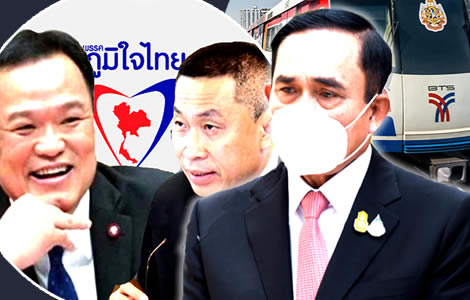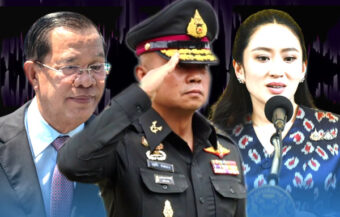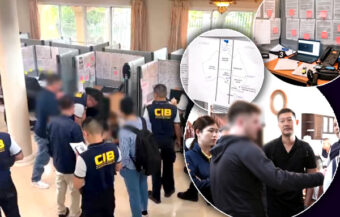Thailand may not only be facing a General Election in 2022 but also another political crisis if the government does not successfully see the passage of two organic laws on the voting process successfully guided through parliament. The likelihood of this happening is also receding in line with the fortunes of the administration with disturbing failures in parliament during this session to reach a quorum.
A General Election looks increasingly likely in Thailand this year after Tuesday’s boycott of cabinet proceedings by the second-largest party in the unwieldy 18 party coalition which has already been severely weakened by infighting within the ruling Palang Pracharat Party, bye-election losses as well as an inability to control and direct proceedings in parliament. The deadline for the government increasingly appears to be July ahead of the tabling of a no-confidence motion in the government expected that month which it is increasingly looking unlikely to survive.

The prospects for the government serving out its final 12 months looked decidedly slimmer on Tuesday after a boycott of the weekly cabinet meeting by the Bhumjaithai Party took place over a contract extension to the BTS Group, the operators of Bangkok’s popular Skytrain system.
Seven ministers did not turn up for the meeting which saw the cabinet sideline the proposal with queries sent back to the Ministry of the Interior and other government agencies for review. It has also emerged that the proposal faces some opposition by officials within the government.
Move portrayed by Bhumjaithai Party MPs as a blow struck for the less well off against corporate interests
In the aftermath of what is seen as a key political development, on Tuesday, Bhumjaithai Party MPs were portraying the move as an effort to protect the position of ordinary people who would have faced a fare increase for the maximum ticket price on the Greenline portion of the network of up to ฿65.
After Tuesday’s meeting, Prime Minister Prayut Chan ocha was tight-lipped.
It is understood that in recent weeks the Prime Minister’s position on the prospect of the government completing its full-term up to March next year has now changed.
On Wednesday, as the Prime Minister thanked the public for their cooperation in fighting off the COVID-19 virus, it appeared the political ground from under him has moved significantly in the last week or so.
Democrat Party leader appeared not confident
On Tuesday morning, before the cabinet meeting, the Minister of Commerce and Deputy Prime Minister Jurin Laksanawisit, the leader of the third-largest party in the coalition, the Democrat Party, could not confidently reject the proposition that Tuesday’s provocative move by the coalition’s second-largest member was a sign that the government had become significantly more unstable.
The government is now challenged by two key issues as it faces into 2022 but there is also now the prospect of deteriorating levels of trust breeding further dangers as the coalition government begins to unravel.
The first fissure was the expulsion of 21 former MPs from the ruling Palang Pracharat Party to the Thai Economic Party led by former junior minister Thamanat Prompow.
Thamanat Prompow increasingly seen as the man who helped forge and destroy Prayut’s government
Mr Thammat played an outside role in mustering support for the government in parliament over the past few years and was particularly involved in forging the unlikely coalition of 18 parties back in 2019.
Mr Thamanat and his overt cabal of MPs were expelled from the party following two by-election defeats in southern Thailand in mid-January after which the former minister demanded a senior cabinet position within the government.
PM moves against cabal within Palang Pracharat behind failed heave against him – Thamanat out
It is also thought likely that he retains influence over other Palang Pracharat Party MPs and indeed MPs across the house.
Mr Thamanat, an MP form Phayao province and a former member of the Pheu Thai Party, was dismissed suddenly from his position as junior minister of agriculture last September after he engineered a heave and attempted parliamentary coup against the prime minister that nearly succeeded in toppling the government.
Palang Pracharat Party portrayed as an ad hoc political contrivance after disastrous Bangkok poll
The rupture within the ruling party, which is led by Deputy Prime Minister Prawit Wongsuwan but which does not have Prime Minister Prayut Chan ocha as a registered member even though he is its candidate for Prime Minister, has led to claims that the party is not a genuine bona fide political movement.
This coupled with its recent losses in 3 by-elections and rising discontent within the party over non-elected ministers and officers in the government have led to rising instability within its ranks.
This is thought to be a growing danger to the government which is facing a possible vote of confidence even if it manages to survive until July with increasing speculation that it cannot survive the vote.
Days leading up to the no-confidence vote in July may prove decisive for the fate of the ministry if it survives that far and that is also now in serious doubt
Under Thailand’s constitution, once a vote of confidence is accepted by the Speaker of the House of Representatives for the debate on the motion, that Prime Minister will not be able to call for a dissolution of the House and fresh election, which is a key prerogative of his office.
This means that July is becoming a key deadline for the administration.
Currently, there are 475 members of the House.
This means that the Prime Minister and his government will need to muster 238 votes. As things currently stand, the unwieldy 18 party coalition, in theory, commands 268 votes but given the increasing political temperature and febrile nature of the developing political environment, it is thought that the government’s chance of winning such a vote is receding quickly as are its chance of survival until then.
Debate in February will raise tensions
At the end of February, the government faces a debate on its performance and handling of the COVID-19 crisis.
This is a parliamentary process without a vote being put to the house but insiders within Government House and the ruling party fear that public scrutiny of the government in parliament may now create further divisions and a growing potential for defections as the government appears to be in terminal decline.
It is understood that Deputy Prime Minister Prawit Wongsuwan and the Palang Pracharat Party were dismayed in recent days when General Wit Devahastin na Ayudhya, a recent appointment as Chairman of an important committee within the party, announced his defection to the Thai Economic Party.
Ruling party polled less than 10% of votes in Bangkok on January 30th last, a seat which it won in 2019
The move comes just a week after the ruling party only managed to poll less than 10% in a by-election in the Chatuchak Laksi area of Bangkok on January 30th last, a constituency which it won in 2019.
Bad news for PM and Palang Pracharat in Bangkok on Sunday as resurgent Pheu Thai Party wins big
The seat was won convincingly by the country’s largest political party and main opposition force Pheu Thai with the radical Move Forward Party coming in second and polling 35% among voters within the ranks of the Royal Thai Army.
As Tuesday’s manoeuvre by the Bhumjaithai Party shows, the increasing rate of inflation and cost of living for the less well off in Thailand is becoming a key political issue along with economic inequality which was aggravated by the pandemic.
Inflation forces expected to recede in 2022 with a final annual figure projected at under 2.5%
This is despite predictions by economists that the situation will moderate gradually as the year progresses, something that will have been noted by the Prime Minister if he is planning on seeking reelection.
Inflation and the cost of living crisis coming on the heels of the pandemic crisis have made voters sore
The cost of living and economic circumstances will be the key consideration for an electorate that has suffered during the COVID-19 crisis more than their peers in western countries and which is increasingly showing signs that it is no longer impressed by the promise of political stability.
The other key issue in the political equation right now is the fate of two electoral bills, the Political Parties Act and the MP Election Act which are designed to revert the kingdom to a dual ballot election process where voters separately choose constituency MPs and list party MPs.
Voting bills and their fate will have a significant impact on the outcome of this crisis which may lead all the way to the Constitutional Court
The new proposal will also come with a plan to reduce the number of party-list MPs from 150 to 100 and will increase the number of constituency seats from 350 to 400.
These legal provisions, together with a new formula to select list party MPs, will effectively see a quota of 350,000 to 370,000 votes required to elect an MP as opposed to the current figure of 70,000.
This will have an enormous impact on smaller political parties and will lead effectively to a dominant ruling party and lead opposition party in parliament.
The reforms are being opposed understandably by the smaller political parties in the current House of Representatives and the radical Move Forward Party.
2017 constitution advisor is against changes to the electoral process favouring larger parties and warns against the potential for lack of accountability
The proposed reforms have also been criticised by Mr Jade Donavanik, a former advisor to the drafting committee of the 2017 constitution who says the proposal will weaken the democratic process and lead to further problems caused by political polarisation and lack of accountability.
‘The new election system will strengthen the government but weaken the people’s power to keep it in check. The system requires political accountability like that seen in Japan where a minister steps down upon being scrutinised or protested,’ he said in December last. ‘Without accountability, it will be bad for checks and balances. The opposition is unable to do its job properly due to a big gap in the number of house seats.’
Lack of parliamentary quorums is disturbing
In recent weeks, the passage of the bills through parliament have been effectively held up due to recurring difficulties in parliament where a quorum has not been attained
This troubling development for the government has been caused, according to House of Representatives Speaker Chuan Leekpai, by a loophole where members can sign into the parliamentary chamber but fail to respond when asked if they are present to vote.
In recent days, the government’s top legal adviser, Deputy Prime Minister Wissanu Krea-ngam, who has also indicated that he may soon be leaving office, has warned that if the bills fail to be passed by parliament then it will inevitably lead to the Prime Minister calling for a dissolution of the house.
The deputy PM has also warned of potential legal problems for the political process ahead if the bills fail to run their course through parliament.
General Election may be fought on the same system seen in 2019 but this may lead to suits brought before the Constitutional Court even before any poll
As things currently stand, it would mean that any General Election called would have to be fought using the original one vote format proposed by the 2017 Constitution and which was the basis for the 2019 poll.
This may inevitably lead to cases being brought to the Constitutional Court challenging any election outcome. This may well happen before any poll takes place.
Meanwhile, despite avowals from the leader of the Palang Pracharat Party, Deputy Prime Minister Prawit Wongsuwan, that his relationship with the Prime Minister Prayut Chan ocha remains steadfast as it has been for 50 years, there is considerable speculation that relations between the ‘brothers in arms’ have been strained by the Prime Minister’s implacable attitude towards Captain Thamanat Prompow with whom General Prawit still associates.
This has even led to speculation that the ruling party may pull its support for the Prime Minister in the run-up to any election or after it.
Status of the Prime Minister’s term in office
The situation is even further complicated by the question of a limit on the term of office for the Prime Minister under the 2017 constitution.
Some experts and political observers suggest that it expires in August based on a maximum term of 8 years specified under Section 158 of the 2017 charter and the PM’s appointment to the office after the 2014 coup.
The section states that any person may not hold office for longer than 8 years whether consecutive or not but excludes periods when a Prime Minister is carrying out the functions or duties of the office after vacating it according to the terms of the charter.
Many legal experts have argued that the Prime Minister’s term only began when appointed by the King following the 2019 General Election under the new Constitution and he is, therefore, eligible to hold the position until at least 2027.
BTS Skytrain contract extension conflict with Bhumjaithai Party not sidestepped by cabinet decision
On Wednesday, it became clear that the conflict within the cabinet over the BTS contract extension has not been deflected by the postponement on Tuesday in response to the boycott of proceedings by Bhumjaithai Party ministers.
Reports suggest that Prime Minister Prayut Chan ocha is determined that the contract extension be given the green light and advised the cabinet meeting on Tuesday that failure by the government to give its imprimatur to the deal, which involves the BTS Skytrain operators taking over ฿37 billion in debt currently on the books of the Bangkok Metropolitan Administration, could be a dereliction of duty under the law.
He is demanding the cabinet’s assent to the contract at its next meeting.
The deal involves extending the contract of the transit company from 2029 to 2059 and setting a maximum price fare on the Greenline of ฿65 in the interim.
Deputy Prime Minister Wissanu Krea-ngam on Wednesday revealed that questions were raised in writing by the Minister of Transport, the Bhumjaithai Party’s Saksayam Chidchob to the Ministry of the Interior concerning the contract over the last 24 hours.
These questions to the Ministry of the Interior by the Bhumjaithai Party-controlled Ministry of Transport were referenced by the Bhumjaithai Party in a statement that said it was open to resolving the matter provided the government follows proper procedure and ensures maximum value for taxpayers’ money and the public interest.
Bhumjaithai Party ministers oppose the contract
It is thought both the leader of the Bhumjaithai Party, Deputy Prime Minister Anutin Charnvirakul and Mr Saksayom are vehemently opposed to the deal, a position strongly supported by the party’s MPs in the House of Representatives and grassroots in the party who are believed to be preparing for the inevitability of an election this year.
The issue over the BTS contract extension is being seen and portrayed by political activists as a fight between corporate interests and the concerns of ordinary people on the ground with the Thailand Consumer’s Council issuing a statement on Tuesday saying a proposed ฿65 fare would make the mass transit system out of the reach of average commuters in the capital.
Join the Thai News forum, follow Thai Examiner on Facebook here
Receive all our stories as they come out on Telegram here
Follow Thai Examiner here
Further reading:
Bad news for PM and Palang Pracharat in Bangkok on Sunday as resurgent Pheu Thai Party wins big
By-election polls amid a weak economy and rising food prices may mean a 2023 General Election
Wife of deposed Bangkok MP Sira campaigns for his job based on his 3 years of service to people
Move against Pheu Thai, the kingdom’s biggest political party, over it’s alleged links to Thaksin
Fears grow that Ferrari Jo will evade justice as local monk offers him support as a ‘peacekeeper’
Police probe high-end Thong Lor club prostitution links and may call in the owners for questioning
Bangkok MP will call to account cabinet ministers who he claims were at a Thong Lor nightlife spot
Government MP and committee Chairman to have his status reviewed by the Constitutional Court
Minister has 15 days as the Constitutional Court accepts a petition filed by the house speaker
Boss Vorayuth case key witness dies riding his motorbike early on Thursday morning in Chiang Mai
Expert stands by evidence that Red Bull Boss Vorayuth’s Ferrari was travelling at 177 km/ph
Strong new evidence suggests that there was no basis to prosecute Red Bull driver ‘Boss’ Vorayuth
Thaksin poses a question to those in power on the same day he was removed from office in 2006
Thaksin’s son faces money-laundering ruling relating to ‘suspicious’ ฿10 million payment
Thaksin cleared in ‘Big Boss’ Krung Thai Bank loan scandal which has so far seen 19 people jailed
Criminal charges likely against student leaders as mysterious ‘People’s Party’ plaque goes missing


















